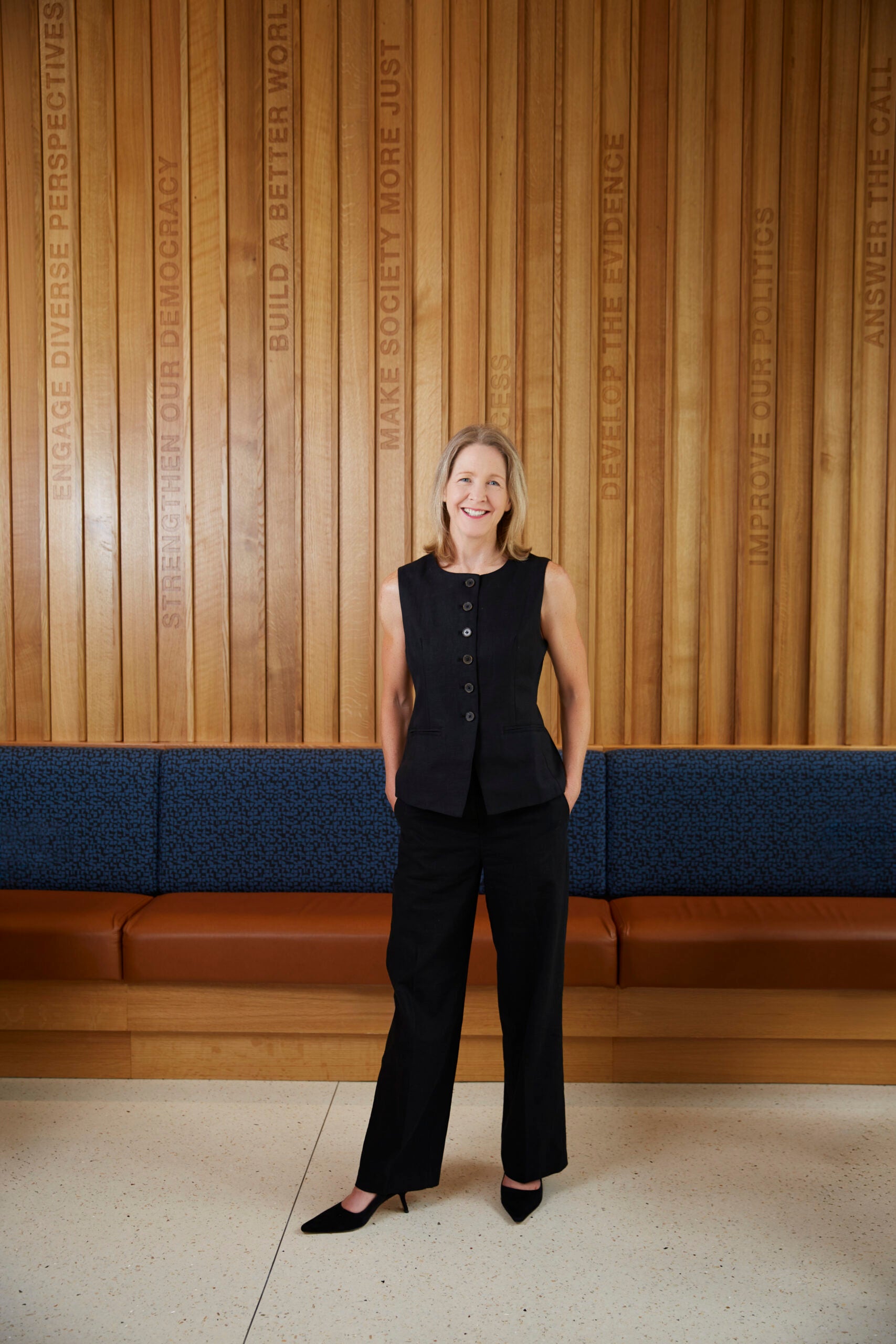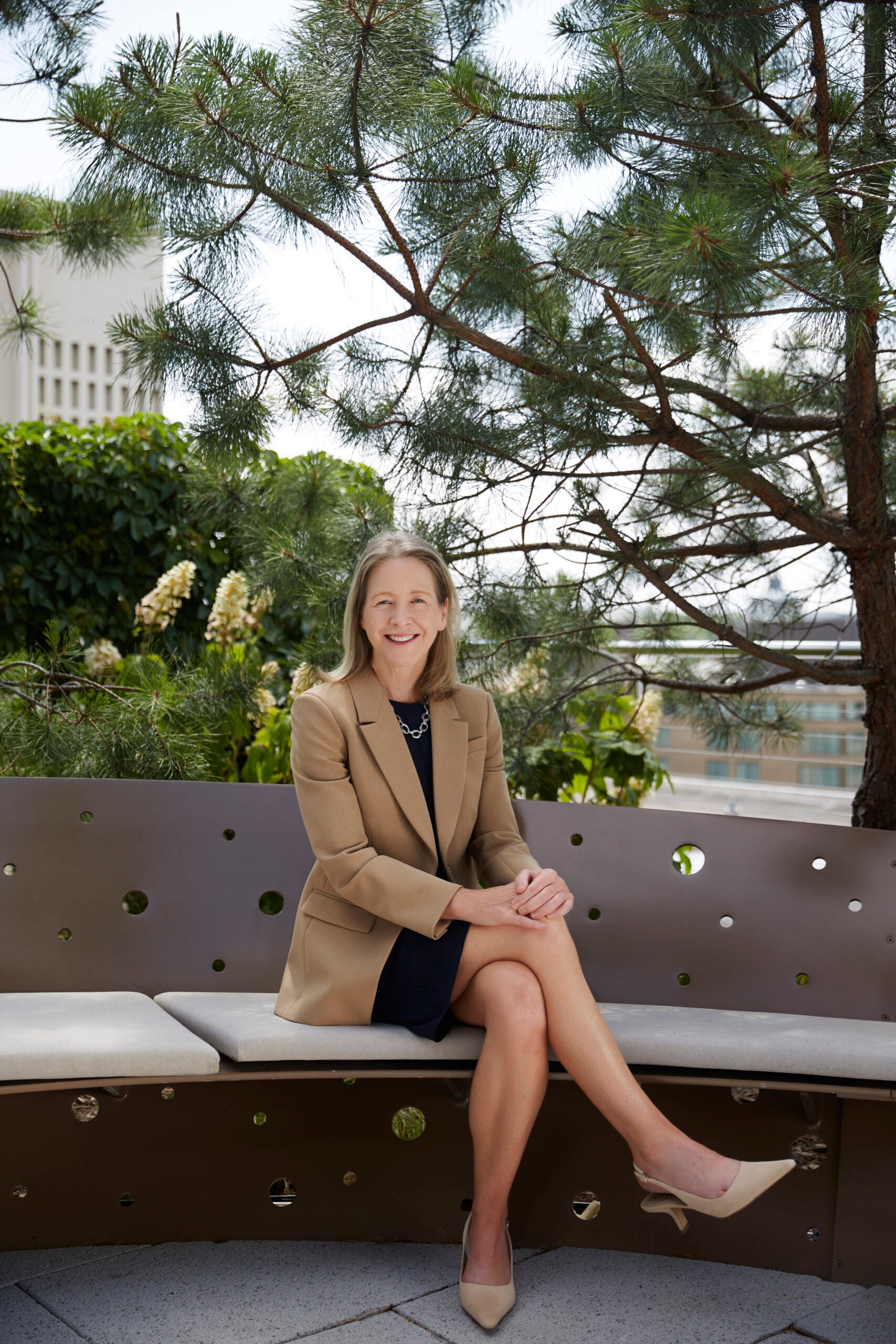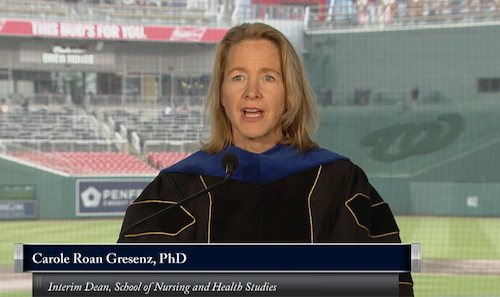Right place, right time: Getting to know Dean Carole Roan Gresenz
This story was written by Judi Ketteler as part of the McCourt School’s annual alumni magazine, Policy Perspectives.
Carole Roan Gresenz, the McCourt School’s new dean, talks about her earliest lessons, her career in research and the things that keep her grounded.

Dean Carole Gresenz
Life took an unexpected turn this past spring when Carole Roan Gresenz went on sabbatical. Staying at Campion Hall, the Jesuit residence at Oxford, she had the chance for the first time in nearly years to press pause.
“I wanted to take some time away from the busy-ness of everyday life, to be more reflective about my work and what I still wanted to accomplish,” she said. That moment to breathe was everything for Gresenz. It also turned out to be the exact time that the candidate search for dean of the McCourt School started after Maria Cancian stepped down last November.
“It would have been hard if I was doing my usual teaching and research to really think about this opportunity,” Gresenz said. “It was such fortuitous timing.”
In the calm of the Jesuit community, among leaders and thinkers from every discipline, she realized how excited she was at the chance to help lead the McCourt School, especially with the expansion of the Capitol Campus and the kickoff of the undergraduate program on the horizon. Even from 3,000 miles away, she knew she was all in.
Early lessons in ethics and independence
Gresenz grew up just outside of Washington, DC, the middle child of eight kids. Her mother had been a high school math teacher but stopped teaching to devote herself to child-rearing. Her father worked at the World Bank for nearly his entire career and eventually served as its chief ethics officer. The family was Catholic, and he also was an ordained permanent deacon at their church and worked in prison ministry.
“His commitment to ethics, justice and integrity came out in everything he did, personally and professionally. He made a priority of impressing on us their importance, and that had a lasting influence on me,” Gresenz said.
Her parents wanted all their children to get a college education, but with limited resources to stretch among them, Gresenz and her siblings were encouraged to look for funding opportunities. In her case, that turned out to be an academic scholarship to Loyola University Maryland. College was where she discovered economics, after taking an intro class and finding that it came easily to her. During her junior year, she spent a semester in DC, taking an economic policy class that involved visiting different institutions and talking with economists working on a range of topics. The light bulb clicked.
“That’s when I decided I wanted to get a PhD in economics and contribute to public policy.”

Dean Carole Gresenz
A career in think tanks
At Brown University, Gresenz’s PhD advisor encouraged her to apply for internships at think tanks, like the RAND Corporation. “I got rejected almost everywhere,” she admits, “but was really fortunate to receive an opportunity to spend the summer at RAND.”
It was the early 1990s, before email and cell phones, when she rode with a friend across the country to live and work at RAND’s Santa Monica location. It felt like a dream come true, with an office right on the beach. She was already a fitness enthusiast and ran nearly every day with her fellow interns. The sun, surf and endless blue sky was a draw, but so was the intellectual environment. After her internship ended, she didn’t want to leave California, leading her to negotiate with her Brown advisor to finish her dissertation remotely. She worked part-time at RAND while taking on house-sitting jobs to avoid paying rent until she was hired full-time at the think tank. Gresenz stayed at RAND for the next 2 years, moving to an office back East in 2000 when her husband took a job in public service, working for the federal government in DC. They started a family — their three kids are now 26, 25 and 22 — and she continued working on everything from research for the military to dispute resolution in healthcare to a large survey on treatments for mental health and substance use disorders.
“Every few years, I would add a new topic and start working with a new team, which kept things intellectually fresh and interesting.” During her time at RAND, Gresenz gained an appreciation for interdisciplinary teams, working not only with other economists but also with political scientists, statisticians, sociologists, lawyers, physicians and other professionals. Since every project had a budget and a timeline, she learned how to be very efficient in her work, scoping a problem and understanding how to break it into relevant pieces.
The move to Georgetown
Ultimately, it was time for something new — a different dynamic than the think tank environment as well as the ability to focus on her own original research. In 2012, she was recruited by Georgetown for the Bette Jacobs Endowed Professorship in what is now called the Department of Health Management & Policy. She held that post for three years, went briefly back to RAND and then found her way to Georgetown again in 2018. In 2019, she stepped in as the interim dean of what was then the School of Nursing & Health Studies. She had barely settled into the role when Covid-19 hit.

Dean Carole Gresenz speaking at Georgetown University’s School of Nursing and Health studies commencement in her capacity as interim dean.
“My one-year commitment suddenly became a lot more,” she said. There were so many pieces to figure out inside the global crisis of the pandemic. Nursing students were not allowed into hospitals for their clinical rotations. Many faculty were also clinicians and became overworked and overburdened. Lab work couldn’t happen in person for undergraduate students in human science. International experiences for global health students were in limbo.
“It was trial by fire,” she said. “But I learned the value of collaboration and adaptability.”
Welcomed to the McCourt School community
Gresenz got to know McCourt Dean Maria Cancian well while serving as an interim dean and was thrilled to be invited to join the McCourt School community in 2022. As a professor, Gresenz taught a thesis class in the MPP program, working with students to develop research questions and think about methods and data. “I really enjoyed seeing the passion they brought to their thesis topic,” Gresenz said. When the prospect of becoming the school’s dean arose, part of Gresenz was reluctant to step away from teaching and research. But discovery and discernment through the interview process convinced her it was the right move. The already sizeable responsibility of the position of dean has added weight in a time of upheaval in the federal government, a time when she says it’s important to be mindful of the sense of instability among faculty, staff and students. She tries to anchor to three things: Georgetown’s values that reflect its Jesuit identity, the McCourt School mission and its stated goal of being the most inclusive public policy school in the nation.
“If we keep those things in the center of all we do, we can approach the future with the right amounts of courage, confidence and thoughtfulness.”
The new dean loves watching students navigate and embrace life on the Capitol Campus, seeing the cross-fertilization happening between undergrads, law students and graduate students in different disciplines.
“There is such a feeling of robustness on the Capitol Campus now,” Gresenz said.
One of the most important things for Gresenz is staying balanced. She enjoys walking her 85-pound rescue dog (“A light in my life,” she said) and unwinding with a good book or an episode of The Great British Baking Show (“I love how they always help each other!”). She still runs but has built a gym in her basement for strength training.
“Exercise helps me stay grounded, she said. Her husband loves water sports — surfing, kite surfing and fishing — but she usually sticks to the land. The two of them will celebrate their 30th wedding anniversary in the coming year while their grown children explore the first act of their careers.
Gresenz isn’t exactly sure which act she’s on now, but she feels grateful to be here. “Maria built a great team,” she said. “I can walk in and have these wonderful students to work with.”